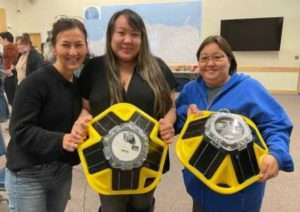
A new ocean science effort to improve equity and inclusion is underway, thanks to a $4.98 million cooperative agreement to three regional associations of the NOAA-led U.S. Integrated Ocean Observing System. The National Science Foundation (NSF) provided the funds through a cooperative agreement for Backyard Buoys, a project to improve ocean data access for Indigenous communities.
Backyard Buoys empowers Indigenous and other coastal communities in the Pacific Northwest, Alaska and the Pacific Islands to collect, steward and use wave data captured by strategically placed buoys to complement their existing knowledge. The effort will support their blue economy, which includes maritime activities, food security and coastal hazard protection.
The initiative brings together a geographically and culturally diverse group of partners that include three regional associations of the NOAA-led U.S. Integrated Ocean Observing System (NANOOS in the Pacific Northwest, AOOS in Alaska, and PacIOOS in the Pacific Islands); Indigenous and education partners from each region; and the wave buoy and sensor company Sofar Ocean. Together, they are working to close the gap in access to coastal and ocean data, especially for Indigenous communities in remote coastal areas.
The initiative is one of six Phase II projects aligned to the Track E: Networked Blue Economy. It is funded through the NSF Convergence Accelerator, a program created to find solutions to large-scale societal challenges related to climate, sustainability, food, energy, pollution and the economy through research, innovation and partnerships. See this Alaska Ocean Observing System press release for more information. For more information, see the Backyard Buoys 2022 Phase 2 press release on the Backyard Buoys page of the PacIOOS website.
|
Climate, weather, and water affect all life on our ocean planet. NOAA’s mission is to understand and predict our changing environment, from the deep sea to outer space, and to manage and conserve America’s coastal and marine resources. See how NOAA science, services, and stewardship benefit your community: Visit noaa.gov for our latest news and features, and join us on social media. |
